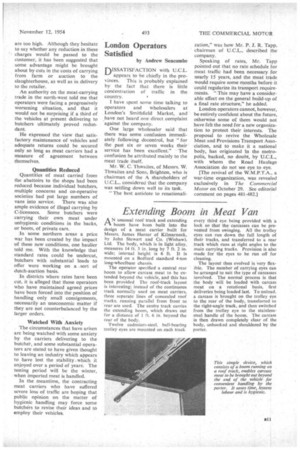London Operators Satisfied
Page 45

If you've noticed an error in this article please click here to report it so we can fix it.
by Andrew Seacombe nISSATISFACTION with U.C.L. L" appears to be chiefly in the provinces. This is probably explained by the fact that there is little coneent ration of traffic in the country.
I have spent some time talking to operators and wholesalers at London's Smithfield Market, and .have not heard one direct complaint against the company.
One large wholesaler said that there was some confusion immediately following decontrol, but "for the past six or seven weeks their service has been excellent." The confusion he attributed mainly to the meat trade itself.
Mr. W. C. Thwaites, of Messrs. W. Thwaites and Sons; Brighton, who is chairman of the A shareholders of U.C.L., considered that the company was settling down well to its task.
" The best antidote to renationali
zation," was how Mr. P. J. R. Tapp, chairman of U.C.L., described the company.
Speaking of rates, Mr. Tapp pointed out that no rate schedule for meat traffic had been necessary for nearly 15 years, and the meat trade would require some months before it could regularize its transport requirements. "This may have a considerable effect on the general build-up of a final rate structure," he added.
London operators cannot, however, be entirely confident about the future, otherwise some of them would not have felt the need for a new organization to protect their interests. The proposal to revive the Wholesale Meat and Provisions Transport Association, and to make it a national body, has originated In the metropolis, backed, no doubt, by U.C.L., with whom the Road Haulage Association do not see eye to eye.
[The revival of the W.M.P.T.A., a war-time organization, was revealed exclusively in The Commercial Motor on October 29. See editorial comment on pages 481-4821




































































































